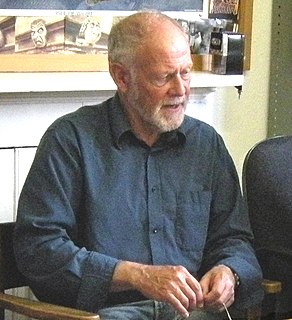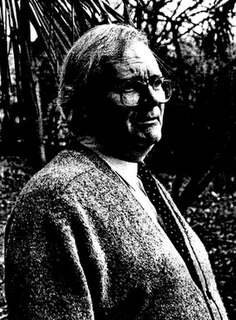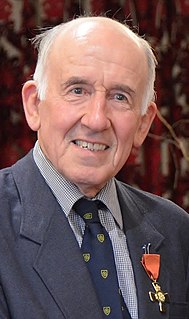Related Research Articles

Andrew Colin Renfrew, Baron Renfrew of Kaimsthorn, FBA, FSA, Hon FSA Scot is a British archaeologist, paleolinguist and Conservative peer noted for his work on radiocarbon dating, the prehistory of languages, archaeogenetics, and the prevention of looting at archaeological sites.

Sir Barrington Windsor Cunliffe,, known as Barry Cunliffe, is a British archaeologist and academic. He was Professor of European Archaeology at the University of Oxford from 1972 to 2007. Since 2007, he has been an Emeritus Professor.

Dorothy Annie Elizabeth Garrod, CBE, FBA was an English archaeologist who specialised in the Palaeolithic period. She held the position of Disney Professor of Archaeology at the University of Cambridge from 1939 to 1952, and was the first woman to hold a chair at either Oxford or Cambridge.

Charles Francis Christopher Hawkes, FBA, FSA was an English archaeologist specialising in European prehistory. He was Professor of European Archaeology at the University of Oxford from 1946 to 1972.

Sheppard Sunderland Frere, CBE, FSA, FBA was a British historian and archaeologist who studied the Roman Empire. He was a fellow at All Souls College, Oxford.

Malcolm Todd was an English archaeologist. Born in Durham, England, the son of a miner, Todd was educated in classics and classical archaeology at St David's College, Lampeter and Brasenose College, Oxford. He subsequently served as a reader and professor at the University of Nottingham and the University of Exeter respectively. During this time, Todd conducted notable excavations at sites of Roman Britain. He was later principal at Trevelyan College, Durham. Todd retired from Durham in 2000, and subsequently dedicated himself to research and writing. He was the author and editor of several works on the archaeology of Roman Britain and the Germanic peoples in the Migration Period.
Michael Gordon Fulford, is a British archaeologist and academic, specialising in the British Iron Age, Roman Britain and landscape archaeology. He has been Professor of Archaeology at the University of Reading since 1993.

Charles Frank Wandesforde Higham is a British-born New Zealand archaeologist most noted for his work in Southeast Asia. Among his noted contributions to archaeology are his work about the Angkor civilization in Cambodia, and his current work in Northeast Thailand. He is a research professor at the University of Otago in Dunedin.
Elizabeth M. Brumfiel was an American archaeologist who taught at Northwestern University and Albion College. She had been a president of the American Anthropological Association.

The Society for the Promotion of Roman Studies was founded in 1910 as the sister society to the Society for the Promotion of Hellenic Studies.
Andrew Ian Wilson is a British classical archaeologist and Head of School of Archaeology at the University of Oxford. He was director of the Oxford Institute of Archaeology from 2009 to 2011. Wilson's main research interests are the economy of the Roman world, Greek and Roman water supply, and ancient technology.

The Faculty of Classics, previously the Faculty of Literae Humaniores, is a subdivision of the University of Oxford concerned with the teaching and research of classics. The teaching of classics at Oxford has been going on for 900 years, and was at the centre of nearly all its undergraduates' education well into the twentieth century.
The Faculty of History at the University of Oxford organises that institution's teaching and research in modern history. Medieval and modern history has been taught at Oxford for longer than at virtually any other university, and the first Regius Professor of Modern History was appointed in 1724. The Faculty is part of the Humanities Division, and has been based at the former City of Oxford High School for Boys on George Street, Oxford since the summer of 2007, while the department's library was removed from the former Indian Institute on Catte Street to the main Bodleian buildings at the start of 2013.
Oxford University Archaeological Society (OUAS) is a society at the University of Oxford which promotes matters of archaeological interest through lectures, excursions and fieldwork. Its membership is not restricted to students, although it is generally run by undergraduate and graduate members of the University.
Emanuele Papi is an Italian classical archaeologist. He is professor of classical archaeology at the University of Siena, and professor of Roman archaeology at the Italian Archaeological School of Athens. His primary research interests are the topography of Ancient Rome, the archaeology of Roman Mediterranean provinces, and the economy and trade of Rome and the Roman Empire.
Eva Margareta Steinby FSA is a Finnish classical archaeologist. She was the director of the Finnish Institute in Rome from 1979–82 and 1992-4, and Professor of the Archaeology of the Roman Empire at the Institute of Archaeology, University of Oxford from 1994-2004. She is best known for her work on the architecture and topography of Rome, especially due to her contributions to the Lexicon Topographicum Urbis Romae (1993-2000).
Christopher Hugh Gosden is a British-Australian archaeologist specialising in the archaeology of identity, particularly English identity. He is Professor of European Archaeology and Director of the Institute of Archaeology at the University of Oxford. He is also a trustee of the British Museum.

Andrew Michael Burnett, is a British numismatist and museum curator, who specialises in Roman coins. He was Deputy Director of the British Museum from 2003 to 2013, and Keeper of its Department of Coins and Medals from 1992 to 2003. He was president of the Royal Numismatic Society from 2013 to 2018.

Gary R. Lock is a British archaeologist and emeritus professor at the School of Archaeology, University of Oxford.

The Department of Archaeology at the University of Sheffield, UK, is an academic department providing undergraduate and postgraduate courses in archaeology and its sub-disciplines based in the city of Sheffield, South Yorkshire. It conducts archaeological associated research with several dedicated research centres. It was founded in 1976, stemming from early archaeology programs in the 1960s as one of the first universities in the UK with a dedicated Department of Archaeology.
References
- ↑ "Institute of Archaeology". School of Archaeology, University of Oxford. Retrieved 2017-02-01.
- ↑ "History of the School of Archaeology". School of Archaeology, University of Oxford. Retrieved 2017-02-01.
- 1 2 "Prof Andrew Wilson". School of Archaeology, University of Oxford. Archived from the original on January 12, 2012. Retrieved August 3, 2018.
- ↑ "Research centres". arch.ox.ac.uk. Retrieved 7 November 2018.
- ↑ "Obituary: Professor Martin Harrison". The Independent. 12 September 1992. Retrieved 23 September 2020.
